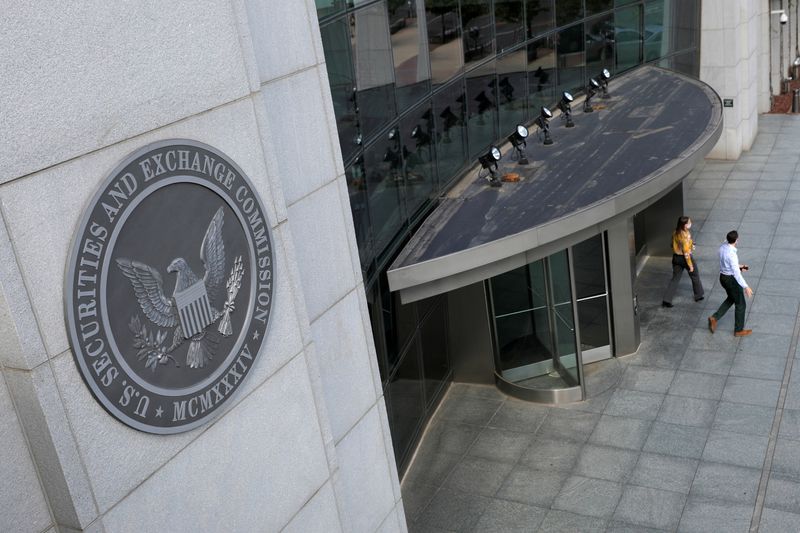
© Reuters. FILE PHOTO: People exit the headquarters of the U.S. Securities and Exchange Commission (SEC) in Washington, D.C., U.S., May 12, 2021. Picture taken May 12, 2021. REUTERS/Andrew Kelly
By John McCrank
NEW YORK (Reuters) – The U.S. Securities and Exchange Commission (SEC) is expected on Wednesday to finalize rules aimed at increasing the resilience of the $5.5 trillion money market fund industry after it received government support during the 2020 market turmoil, according to its public agenda.
But the agency has scrapped a proposed new pricing model that had been strongly opposed by asset managers and trade groups, Bloomberg reported on Tuesday evening.
A spokesman for the SEC did not immediately respond to a request for comment.
Money market funds saw massive outflows in March 2020 at the onset of the coronavirus pandemic, prompting the U.S. government to intervene to stabilize them. The panic was reminiscent of 2008 when a run on money market funds threatened to freeze up global markets and prompted the government to backstop the sector.
Critics have said money market funds, which are a key source of short-term corporate and municipal funding, now enjoy an implicit government guarantee.
In December 2021, the SEC proposed new liquidity requirements for money market funds, as well as scrapping redemption fees and restrictions.
It also proposed adjusting funds’ value in line with dealing activity, a process known as “swing pricing” which has drawn major pushback from the industry.
Swing pricing, which under the proposal would have been applied to institutional prime and institutional tax-exempt money market funds, requires redeeming investors, under certain circumstances, to bear the liquidity costs of their redemptions.
In theory, “swing pricing” reduces the incentive to run to the exit first.
Major asset managers, however, have said it is not appropriate for money market funds, which invest in high-quality short-term debt instruments and are designed to handle large amounts of flows for daily cash management purposes. They said the added cost of redeeming their cash would drive investors away from the funds and would have been very challenging to implement.
“Swing pricing is more likely to deter investors from entering money market funds in the first place rather than deter investors who are already in that money market fund from redeeming,” the Securities Industry and Financial Markets Association, said in a letter to the SEC.
Other influential groups, including the Investment Company Institute and the U.S. Chamber of Commerce also opposed swing pricing. Reuters could not ascertain if the SEC had made revisions to the final rule in response to the industry concerns.
The SEC commissioners are scheduled to vote at 10:00AM ET.





